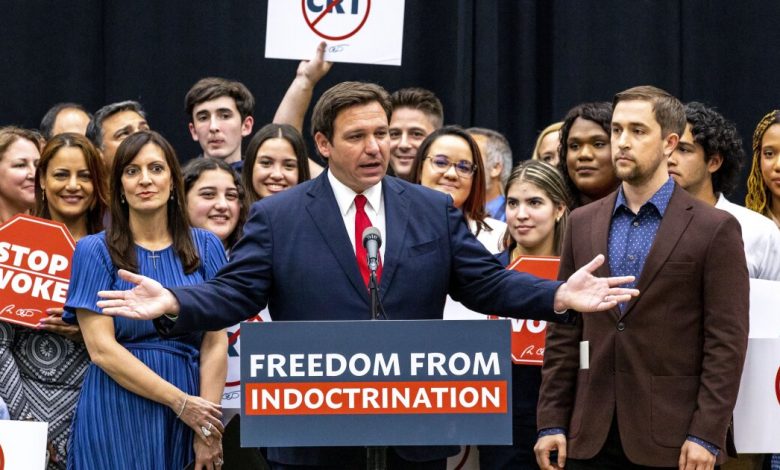Legislation to Limit Critical Race Theory at Colleges Has Reached Fever Pitch

[ad_1]
Bills introduced in state legislatures across the country have increasingly taken aim at higher education and the discussion of race, racism, and gender in college classrooms and programs.
That’s according to new data from PEN America, an advocacy group for free expression, which began tracking all such bills, including those aimed at K-12, in January 2021. So far, 70 bills — which PEN America calls “educational gag orders” — have been introduced in 28 states, with 56 more coming in 2022. The upswing signals an increased effort by lawmakers in those states to limit the discussion of certain topics on campuses, according to the group.
Over all, 42 percent of these legislative proposals have targeted higher ed in 2022, up from 26 percent last year. Most of them have been introduced by Republicans who are concerned about what they consider to be liberal indoctrination on campuses.
Though the bills come from different statehouses across the U.S., most of them share a similar goal: combating the teaching of critical race theory and other topics that lawmakers have labeled “divisive concepts.”
On Wednesday, PEN America and the American Association of Colleges and Universities, which represents more than 1,000 colleges and is an advocate for liberal-arts education, issued a joint statement to bring attention to the threat these bills pose to higher education.
Suzanne Nossel, chief executive of PEN America, said that as a free-speech defense organization, PEN America recognizes that “not all threats to free speech are created equal.” The most concerning threats, Nossel said, are those that go directly against the First Amendment.
“Legislation that is dictating what can and cannot be taught in the classroom is really at the top of that pyramid,” she said. Nossel added that the issue transcends politics, and university leaders should speak publicly about how these bills could harm colleges.
Lynn Pasquerella, president of the AAC&U and a former president of Mount Holyoke College, said the legislation threatens colleges’ independence, which is important for academic quality and integrity. Freedom from undue political influence is also required by accrediting agencies, she said. (Accreditors regulate colleges’ access to federal financial aid.)
Legislation “dictating what can and cannot be taught in the classroom is really at the top of that pyramid.”
Increasingly, the bills are beginning to have real-world consequences for colleges, according to the two organizations. Of the 70 proposed bills, seven have become law in seven states — all of which have Republican legislatures and governors — with four taking effect since March.
One of those new laws is in Florida. Gov. Ron DeSantis and other Republican lawmakers have championed the “Stop WOKE Act,” which bars colleges from compelling anyone to believe, among other things, “that an individual … bears personal responsibility for and must feel guilt, anguish, or other forms of psychological distress because of actions committed in the past by other members of the same race, color, sex or national origin.”
After the bill passed in April, the University of Florida sent a presentation to faculty members about understanding the new law, directing them to “enable students to reach their own conclusions without instructor bias,” which means “not imposing personal views about controversial topics.” University leaders also warned that violating the law could cost them millions in state funding.
At Iowa State University, where there’s also a state law on the books, faculty members have been instructed to not “draw scrutiny” to their courses, according to PEN America.
In April, Tennessee’s governor signed a bill that focused on 16 “divisive concepts,” such as Tennessee or the United States being described as “fundamentally or irredeemably racist or sexist.”
Before the bill was signedinto law, the University of Tennessee at Knoxville issued a statement regarding the bill and the university’s concern “about the potential chill that faculty and staff may feel about the outstanding work they are doing.”
The legislation, said Jeremy C. Young, senior manager of free expression and education at PEN America, can create “a chilling effect even when they don’t explicitly ban something.”
[ad_2]
Source link






